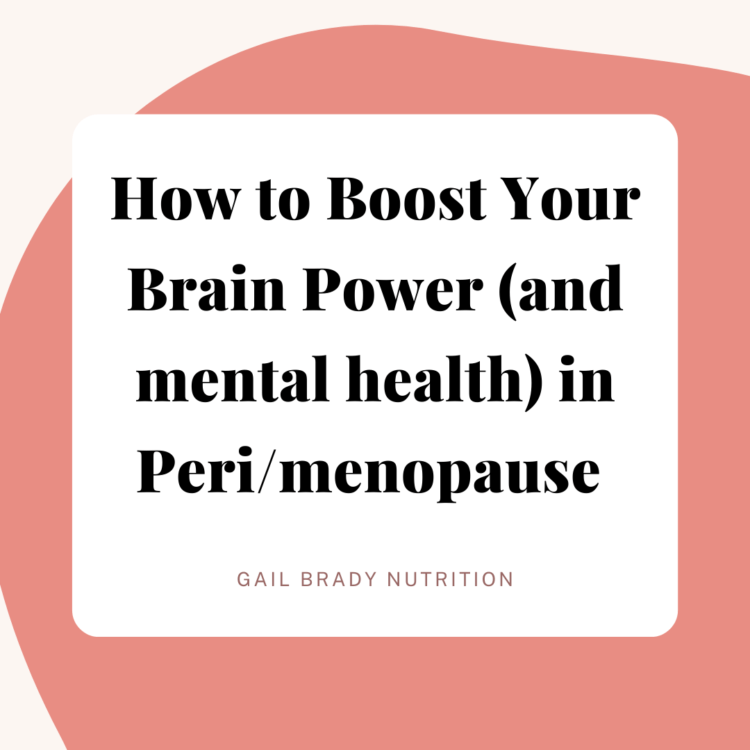Boosting Brain Health in Menopause
Cognitive issues are some of the most common symptoms experienced by women in peri-menopause.
These include brain fog, poor memory, anxiety, low mood and depression.
In part, this is thought to be due to the declining levels of the sex hormones oestrogen, progesterone and testosterone. For most women, this starts in their early 40s.
Without oestrogen to bind to receptors in the brain, you may experience brain fog. Whilst progesterone has a calming effect and without it, anxiety may be increased. And lower levels of testosterone can leave us feeling less motivated and focused.
The women I talk to are also often concerned with protecting themselves against Alzheimer’s disease and dementia.
Brain health
Aside from sex hormones, brain health can be negatively influenced by the stress hormone cortisol, by an imbalance in thyroid hormones, as well as spikes in blood sugar and insulin. All of which are more common during peri-menopause.
Low levels of vitamin D and compromised gut health can also be contributing factors.
Imbalances in gut health may be experienced as IBS, indigestion, acid reflux, bloating, food sensitivities, constipation or diarrhoea.
Alcohol intake can also influence mood and memory issues. It is recommended to have 3 consecutive alcohol-free days a week and to drink no more than 14 units per week.
Moderate levels of exercise, however, have been shown to be as effective as antidepressants for mild to moderate anxiety and depression. That’s 30 minutes a day for 5 days a week.
Neurotransmitters
Neurotransmitters are the messengers transmitted between the neurons (nerve cells) in your brain to the muscles in your body. They control bodily functions.
Your cognitive health is influenced by the production of neurotransmitters such as serotonin which helps to control mood. A large proportion of serotonin is made in the gut. Another reason to pay attention to, and to support your gut health.
In order to make adequate amounts of neurons, certain nutrients are needed from your diet.
Once oestrogen, progesterone and testosterone start to decline, diet becomes even more important for providing essential nutrients to the brain.
Getting enough rest and sleep are also important components of brain health.
Seven Key Nutrients for Optimal Brain Health
Protein
Protein provides the building blocks (amino acids) for making neurotransmitters. In addition, the brain thrives on balanced blood sugar and insulin. Eating a protein source (e.g salmon, chicken, lentils) with each meal and snack can help balance blood sugar and insulin levels.
Healthy Fats
Your brain is made up of about 60% fat. Healthy fats are therefore essential for brain health. Omega-3 fatty acids have been shown to support mood-regulating neurotransmitters as well as reduce inflammation
Healthy fats include: Oily fish (e.g salmon, mackerel, sardines), Walnuts, Olive oil, Avocado, flax and chia seeds help to nourish the brain.
B vitamins
B vitamins, especially B6, B12 and folate are needed for neurotransmitter function.
These B vitamins are found in leafy greens (e.g kale, cauliflower, spinach, broccoli), eggs, lentils, chicken, nuts and seeds. However, it is quite hard to get adequate levels of B12 from non-animal sources unless they are fortified. If you are vegan or vegetarian, I recommend testing as you are likely to need a supplement.
Magnesium
There is a direct correlation between stress and magnesium levels. The more stress you experience, the more magnesium you are likely to need. Low levels of magnesium can lead to low mood, poor sleep and low energy. Magnesium also helps to regulate serotonin, a neurotransmitter and therefore mood.
Magnesium can be found in green leafy vegetables, tofu, avocado, nuts and seeds, beans and pulses.
Zinc
Zinc is needed for optimal brain function. It also supports the process of making new brain cells. A deficiency in zinc has been linked to low mood and depression. You are more likely to be deficient in zinc if you are vegan.
Zinc is found in meat and shellfish, eggs and asparagus. It is also present in nuts (cashews) and seeds (pumpkin) but is less easily absorbed from these sources.
Vitamin D
Unlike other nutrients, it is very difficult to get adequate vitamin D from your diet. The main source of this essential vitamin (which is actually a pre-hormone) is sunlight.
Small amounts of vitamin D can be obtained from oily fish, eggs, some mushrooms and fortified foods but most people will need to supplement during the winter months.
Iron
Low levels of iron or iron-deficient anaemia can cause memory issues.
Food sources include lean meat and shellfish, tempeh, tofu, lentils, chickpeas, kidney beans, dried apricots, green leafy vegetables. Iron is however best absorbed from animal sources. Adding a source of vitamin C to plant-based foods can help with absorption.
HRT
HRT is an option for some women to replace oestrogen and progesterone and this may be beneficial for brain fog and memory issues symptoms. In some cases, testosterone may also be prescribed. Please speak to your GP or menopause doctor to find out if it is right for you.
Here are some 12 types of food to boost your brain and mental health
- Lean meat
- Poultry – chicken & turkey
- Oily fish – salmon, sardines, mackerel
- Shellfish
- Soy -Tempeh or organic tofu
- Nuts and seeds – walnuts, cashews, pumpkin, flax & chia seeds
- Healthy fats – avocado, olive oil, coconut oil
- Eggs
- Lentils
- Beans and pulses – chickpeas, kidney beans
- Green leafy vegetables – broccoli, spinach, kale, cauliflower
- Dried apricots
Eating a protein and healthy fat-based breakfast is a great way to start the day with mental clarity
For more tips and advice on perimenopause and menopause join a growing group of like-minded women here
To receive your FREE checklist of the Top 10 Foods to Include in Your Diet During Menopause click here

